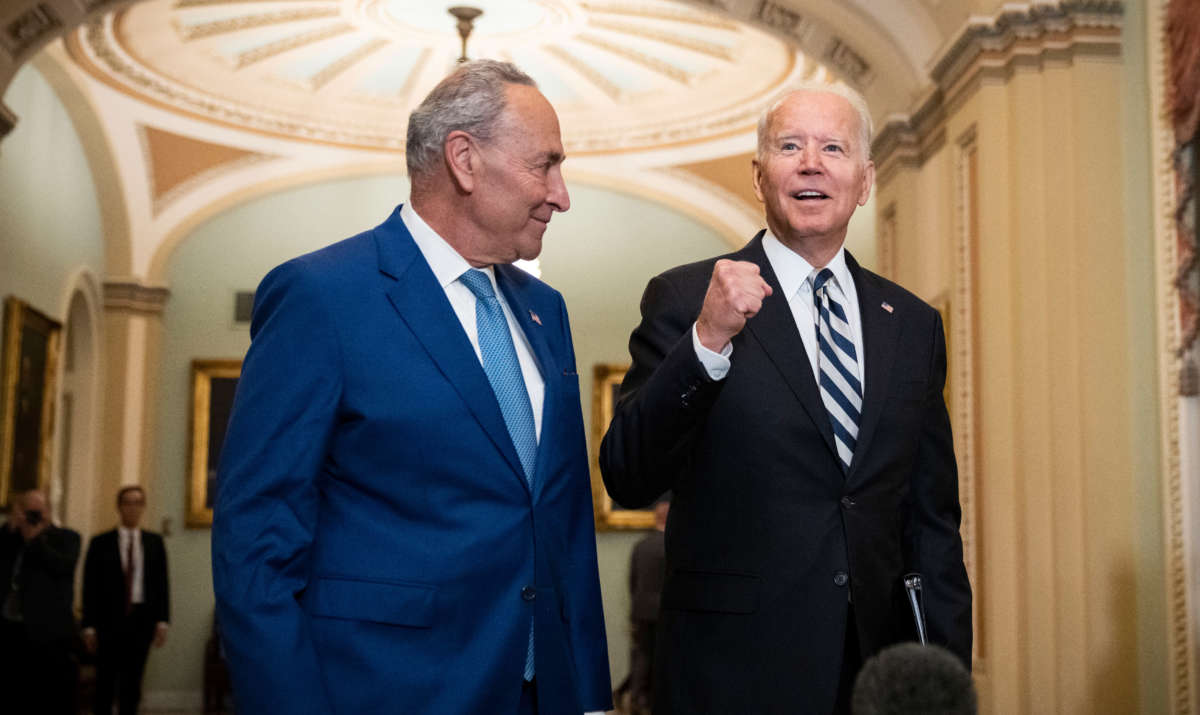Did you know that Truthout is a nonprofit and independently funded by readers like you? If you value what we do, please support our work with a donation.
A number of new polls out this week seem to suggest good news for Democrats in the upcoming 2022 midterms — and troubling news for Republicans (particularly former President Donald Trump) when it comes to the next presidential election.
Such numbers may not hold steady in the years or even months ahead. But having an understanding of what the data says now gives political parties and candidates for office a better sense of where things are going, and how to adjust strategy if necessary.
For Democrats, things seem to be going in the right direction.
In the latest NPR/PBS NewsHour/Marist National Poll published on Thursday, respondents were asked to share which political party they would most likely support if the 2022 midterm races were being held today. Democrats obtained a plurality of support, with 46 percent of registered voters saying they’d be more likely to back a candidate from that party for their congressional district races, versus just 38 percent who said they’d back a Republican candidate.
While there’s still a little more than a year left before Election Day 2022, early polling is often indicative of the direction elections may be headed. In 2017, after an Economist/YouGov poll showed that voters preferred Democrats to Republicans by six points, Democrats went on to win the House elections by around eight points.
It’s less clear what voters want when it comes to presidential elections. Biden has the approval of 45 percent of registered voters who participated in the poll, while 46 percent said they disapprove — figures that represent a statistical tie. His approval rating is up two points when compared to the poll’s findings earlier this month. During that time, his disapproval rating has diminished by five points.
These numbers don’t indicate how Biden would perform in a 2024 presidential race if he decides to run for a second term. However, they do show that he would have a reasonable chance of winning, particularly if Trump, his rival in the 2020 race, decides to run again.
Last month, polling from Quinnipiac University found that only 32 percent of respondents felt it would be a “good” thing if Trump ran again, while 60 percent said it would be “bad” for the country. Coupled with those results, the numbers from the NPR/PBS NewsHour/Marist poll suggest that if Biden does run again, with Trump as his GOP opponent, he has a good shot at reelection.
Of course, that’s assuming that Trump remains the frontrunner — and the eventual nominee — for the Republican Party. An additional poll that was released this week, conducted by the Super PAC run by Trump’s former National Security Advisor John Bolton, shows that the former president may be losing ground to another potential GOP candidate.
Within that poll, 26.2 percent of respondents said that if the Republican primary for president in 2024 were held today they would back Trump, while 25.2 percent said they would support Gov. Ron DeSantis of Florida. The poll has a 3.1 percent margin of error, which means that at the moment, the two potential candidates for president are tied within a hypothetical Republican primary.
Despite DeSantis’s potential as a future GOP nominee, this doesn’t necessarily spell out good news for the Republican Party. Polling conducted in August shows that DeSantis is viewed unfavorably by 36 percent of the voting public, while only 29 percent see him in a positive light. 35 percent said they didn’t know enough about him to form an opinion.
The numbers from all of these polls — from the congressional races to the presidency — are likely to fluctuate between now and when elections are held. But they do indicate the current trajectory of voters’ opinions of potential candidates, and shouldn’t be dismissed out of hand.
Media that fights fascism
Truthout is funded almost entirely by readers — that’s why we can speak truth to power and cut against the mainstream narrative. But independent journalists at Truthout face mounting political repression under Trump.
We rely on your support to survive McCarthyist censorship. Please make a tax-deductible one-time or monthly donation.
